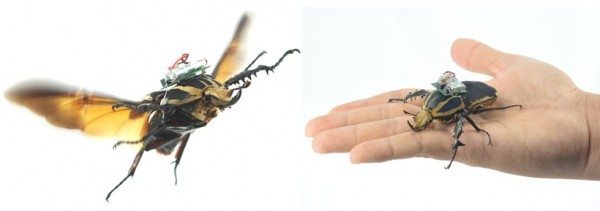 Hey, look! It’s a beetle with a backpack! An electronic backpack. Cool. But why does he have this backpack? Well, in an effort to better understand the musculature of insect locomotion, scientists and engineers from the University of California Berkeley and Singapore’s Nanyang Technological University (NTU) strapped on tiny computers and wireless radio controls to the backs of giant flower beetles (Mecynorrhina torquata) and placed tiny electrodes onto the target areas (muscles and optic lobes) to remotely control the flying of the beetles. This allowed them to study insect flight without tethering. In these studies, a small muscle that is known to be involved in folding the insect’s wings was also discovered to play an important role in fine steering during flight (Berkley News). After this discovery, the engineers and scientists were able to better steer the insect during remote controlled flight as well as control “flight initiation and cessation” and hovering (Berkley News). In another study on remote controlled insect locomotion, researchers were able to successfully adjust the speed, step length, and walking gait of the giant flower beetle.
Hey, look! It’s a beetle with a backpack! An electronic backpack. Cool. But why does he have this backpack? Well, in an effort to better understand the musculature of insect locomotion, scientists and engineers from the University of California Berkeley and Singapore’s Nanyang Technological University (NTU) strapped on tiny computers and wireless radio controls to the backs of giant flower beetles (Mecynorrhina torquata) and placed tiny electrodes onto the target areas (muscles and optic lobes) to remotely control the flying of the beetles. This allowed them to study insect flight without tethering. In these studies, a small muscle that is known to be involved in folding the insect’s wings was also discovered to play an important role in fine steering during flight (Berkley News). After this discovery, the engineers and scientists were able to better steer the insect during remote controlled flight as well as control “flight initiation and cessation” and hovering (Berkley News). In another study on remote controlled insect locomotion, researchers were able to successfully adjust the speed, step length, and walking gait of the giant flower beetle.
Remote controlling of insects is useful not only in studying their biology but, because of their small size, could also aid in searching for survivors in collapsed buildings or disaster sites (Dezeen). Live insects can maneuver around obstacles with ease, so when presented with such an obstacle the “the user can simply switch off the controller, allowing the intrinsic neural control networks of the robot [insect–computer hybrid robot] to overcome or avoid the obstacle” (Journal of the Royal Society). And, just in case you were wondering, “all the beetles involved in the project went on to live for their usual lifespan of between five and six months” (Dezeen).



Gadgeteer Comment Policy - Please read before commenting
“Flight initiation”: give electric shock – Hey, it flies!
“Steer right”: Paralyze one wing – Hey, it works!
“Try to justify some creepy research?”: Use a) desaster relief, b) help for the physically impaired or c) cute kittens
“Need to ventilate your frustration”: Post sarcastic comments on the internet 🙂
Wow, controlling another living thing’s movements this way is kind of scary. What if some other alien race wanted to research us and start strapping things to our backs and ‘electronically’ control what we did? I know they can argue intelligence and other differences, but I really do think this sounds like a very bad form of research.
Lynn – I would agree that this kind of research poses ethical questions such as those you brought up. But studying how the brain functions with things like muscle movement have led to some important developments that improve lives. Here are some examples. Brain implants have been used in those who suffer from severe tremors from Parkinson’s. These devices have helped to drastically reduce those tremors to make life much easier for them. There have been experiments testing whether or not brain implants and electrodes could be used to stimulate paralyzed areas of the body to restore function. There are also cases of brain implants used to help decrease epileptic seizures in those who suffer from them. All of these advances needed to study how the brain controls our bodies not so people can control other people but so that individuals can restore control over their own bodies. Learning how the brain controls parts of the body (by using test subjects) can lead to these types of beneficial devices that truly help those who struggle with the debilitating effects of certain disorders. Of course with just about any science or technology comes a level of responsibility and commitment to use it well to help others and unfortunately there are those out there who will want to use it inappropriately so we should always question and hold accountable those who appear to be misusing/abusing science. I wrote this article because I thought it was thought provoking and at one point, it did leave me feeling a little uneasy. The fact that the beetles lived out their full life span left me feeling like the researchers were trying to be responsible.